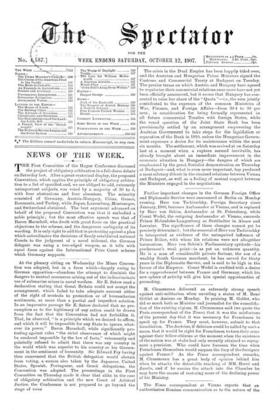At the plenary sitting on Wednesday the Mines Conven- tion
was adopted, but in a form which—largely owing to German opposition—abandons the attempt to diminish the dangers to neutral commerce arising out of the indiscriminate use of submarine mines in naval warfare. Sir E. Satow read a declaration stating that Great Britain could not accept the arrangement, which failed to take adequate account either of the right of neutrals to protection or of humanitarian sentiments, as more than a partial and imperfect solution. In an impressive passage Sir E. Satow declared that no pre- sumption as to the legitimacy of any action could be drawn from the fact that the Convention had not forbidden it. That, he observed, " is a principle which we desired to affirm, and which it will be impossible for any State to ignore, what- ever its power." Baron Marschall, while significantly pro- testing against rules " the strict observance of which might be rendered impossible by the law of facts," vehemently and pointedly refused to admit that there was any country in the world which was superior to his country or his Govern- ment in the sentiment of humanity. Sir Edward Fry having then announced that the British delegation would abstain from voting, a *course also taken by the Japanese, United States, Spanish, Portuguese, and Greek delegations, the Convention was adopted. The proceedings in the First Committee on Thursday made it clear that alike in the case of obligatory arbitration and the new Court of Arbitral Justice, the Conference is not prepared to go beyond the stage of vceux










































